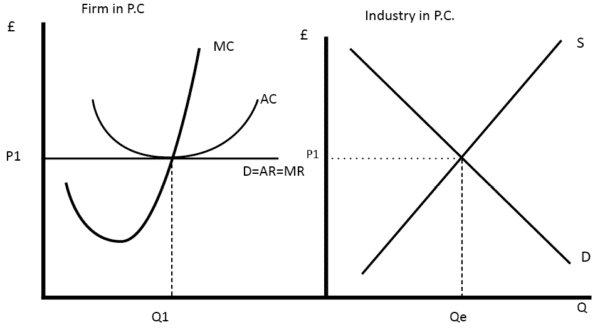This occurs when a firm or consumer has no option but to accept the price set by the market.
When a firm is a price taker – it means they have no ability to set a price that they would like to charge. A price taker will lack market power.
Conditions for being a price taker
If a market is perfectly competitive, then every firm will be a price taker. This is because if they try to sell at a higher price, consumers will not buy. This is because
- There is perfect information – consumers will know cheaper goods are available.
- Homogenous product. If the product is the same, consumers can easily switch to alternatives.
- Freedom of entry and exit – If prices are too high and firms make supernormal profit, it will encourage new firms to enter the market.
Perfectly competitive market

- The market equilibrium price is set where S=D, setting a market price of P1.
- A firm in perfect competition has a perfectly elastic demand curve and makes normal profits. The firm has to be a price taker and charge P1 also.
- If the firm tried to charge a higher price than P1, it would be unable to sell because consumers can buy at the market price elsewhere.
Example of price takers
- If a grocery seller is selling produce in a market, then they will need to set a price at the same as the market price. If they try to sell their potatoes at a higher price they will not be able to sell.
- Foreign exchange seller. If a company tries to sell foreign exchange at a higher price than the market price, it will be to no effect. They will have to accept the market price for currency sales as it is easy for buyers to compare.
- A consumer who goes shopping in a supermarket will be a price taker, you can’t bargain with the supermarket to ask for discounts.
Price taker vs Price maker
- The opposite concept is a price maker – when a firm has monopoly power and is able to choose which price to set because consumers have no alternative. To gain more market power, a firm can try and differentiate its product.
- A consumer can be a price maker if it has large buying power and can put pressure on suppliers to offer discounted rates. For example, a supermarket can use its monopsony power to pay below average prices to farmers.
Wage taker definition
A similar concept is a wage taker. This is when employees have no market power and have to accept the market wage.
